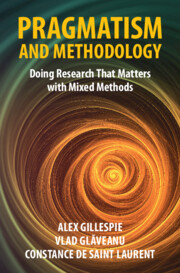Pragmatism and Methodology
Taking a pragmatist approach to methods and methodology that fosters meaningful, impactful, and ethical research, this book rises to the challenge of today’s data revolution. It shows how pragmatism can turn challenges, such as the abundance and accumulation of big qualitative data, into opportunities. The authors summarize the pragmatist approach to different aspects of research, from epistemology, theory, and questions to ethics, as well as data collection and analysis. The chapters outline and document a new type of mixed methods design called “multi-resolution research,” which serves to overcome old divides between quantitative and qualitative methods. It is the ideal resource for students and researchers within the social and behavioral sciences seeking new ways to analyze large sets of qualitative data.
Alex Gillespie is Professor of Psychological and Behavioral Science at the London School of Economics and Political Science and Visiting Professor II at Oslo New University. He is an expert on communication, especially divergences of perspective, misunderstandings, internal dialogues, distrust, and problems in listening. He uses a variety of research methods and has developed several methodological tools.
Vlad Glӑveanu is Professor of Psychology at Dublin City University, and Visiting Professor II at the Centre for the Science of Learning and Technology, University of Bergen. He is a leading expert in the fields of creativity, imagination, wonder, collaboration, and culture research, as well as the Founder and President of the Possibility Studies Network and Editor of Possibility Studies & Society (SAGE).
Constance de Saint Laurent is Assistant Professor of Sociotechnical Systems at National University of Ireland, Maynooth. She works on trust in technology as well as on the impact of technology and societal changes on people and organizations. She has previously carried out research on social media, misinformation, collective memory, and representations of alterity, some of which has been published in the open access book Social Thinking and History: A Sociocultural Psychological Perspective on Representations of the Past (2021).
